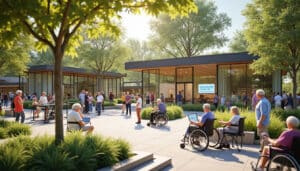The Activity and Adapted Care Center (PASA) proves to be a fundamental structure within nursing homes (EHPAD), addressing specific challenges related to the care of elderly people suffering from cognitive disorders. By promoting a secure and stimulating environment, PASA offers tailor-made activities aimed at maintaining and improving the quality of life of residents. Its definition goes well beyond a simple animation framework; it encompasses a holistic approach necessary to support seniors while taking their individual needs, the preservation of their autonomy, and the strengthening of social ties into account.
The Activity and Adapted Care Center (PASA) is a structure in the medico-social sector designed to support residents of nursing homes suffering from moderate cognitive disorders, such as those related to Alzheimer’s disease. Its primary objective is to improve the quality of life of elderly people by providing adapted activities and specific supervision, thereby maintaining their autonomy and well-being.
PASA stands out for its personalized approach. It is a secure space where residents can participate in social and therapeutic activities while benefiting from constant support from a multidisciplinary team. This team consists of nursing assistants, animators, psychomotor therapists, and a coordinating physician, all trained in the specifics of cognitive disorders.
The activities offered within the PASA framework are varied and tailored to the needs of residents. They can include memory workshops, music therapy sessions, creative activities, and gentle physical exercises. These interventions aim to stimulate the cognitive and motor dimensions of residents, while also promoting social exchange, which is crucial for reducing the isolation often felt by the elderly.
One of the main challenges of PASA is maintaining social connections. Indeed, seniors living in nursing homes may find themselves isolated, especially if they suffer from behavioral disorders. PASA creates an enriching environment where residents can interact, share moments of conviviality, and participate in common projects, thereby improving their quality of life.
PASA also aims to mitigate the behavioral disorders often associated with neurodegenerative diseases. Through a non-medication-based approach, it is possible to soothe residents by offering stimulating and adapted activities. This contributes not only to their emotional well-being but also to reducing the need for medication treatments such as psychotropic drugs.
Eligibility for a PASA is based on clear criteria. It primarily targets residents of nursing homes who have moderate cognitive disorders related to specific pathologies. It is essential that these individuals are capable of benefiting from the proposed support without worrying or disturbing other residents.
The admission process to PASA is generally decided by the multidisciplinary team of the nursing home, following an in-depth medical assessment and a discussion with the resident and their family. This ensures that the program is adjusted according to individual needs, thus providing a personalized living framework.
In terms of costs, admission to PASA is included in the overall fee for care in nursing homes, which ensures families that no additional costs will be applied to benefit from these services. This point is particularly reassuring for families who may be concerned about the financial aspects related to the care of their elderly loved ones.
Finally, raising awareness among families about the role and benefits of PASA is a crucial issue. By involving them in the care process, they can better understand the importance of the proposed activities and encourage their loved ones to participate. This not only improves the resident’s experience but also strengthens family ties, thus contributing to a more encouraging and positive environment.

Frequently Asked Questions (FAQ) about the Activity and Adapted Care Center
What is PASA? PASA, or the Activity and Adapted Care Center, is a unit within nursing homes that offers specific support to elderly people suffering from moderate cognitive disorders.
What is the purpose of a PASA in nursing homes? PASA aims to improve the quality of life of residents by offering adapted activities and a secure environment, while preserving their autonomy and social connections.
What are the objectives of PASA? Objectives include maintaining autonomy, preserving cognitive capacities, improving quality of life, and reducing behavioral disorders.
Who can benefit from a PASA? PASAs mainly welcome residents with moderate cognitive disorders, such as those related to Alzheimer’s disease.
How to join a PASA in nursing homes? Entry to PASA is decided by the multidisciplinary team of the nursing home after a medical and behavioral assessment of residents.
What activities are proposed in PASA? Activities include memory workshops, sensory activities, creative projects, and gentle motor exercises to stimulate residents’ abilities.
What is the cost of care in PASA? The cost of admission to PASA is included in the dependency rate of the resident and does not require any additional cost.
What professionals work within a PASA? A multidisciplinary team makes up the PASA, including nursing assistants, nurses, animators, and other professionals trained in cognitive disorders.
How does PASA contribute to the mental health of residents? PASA helps slow down the progression of cognitive disorders and promotes emotional well-being through stimulating activities and psychological support.
What is the role of families in PASA? Families play a key role in encouraging their loved ones’ participation and maintaining communication with staff to adapt care according to residents’ needs.











